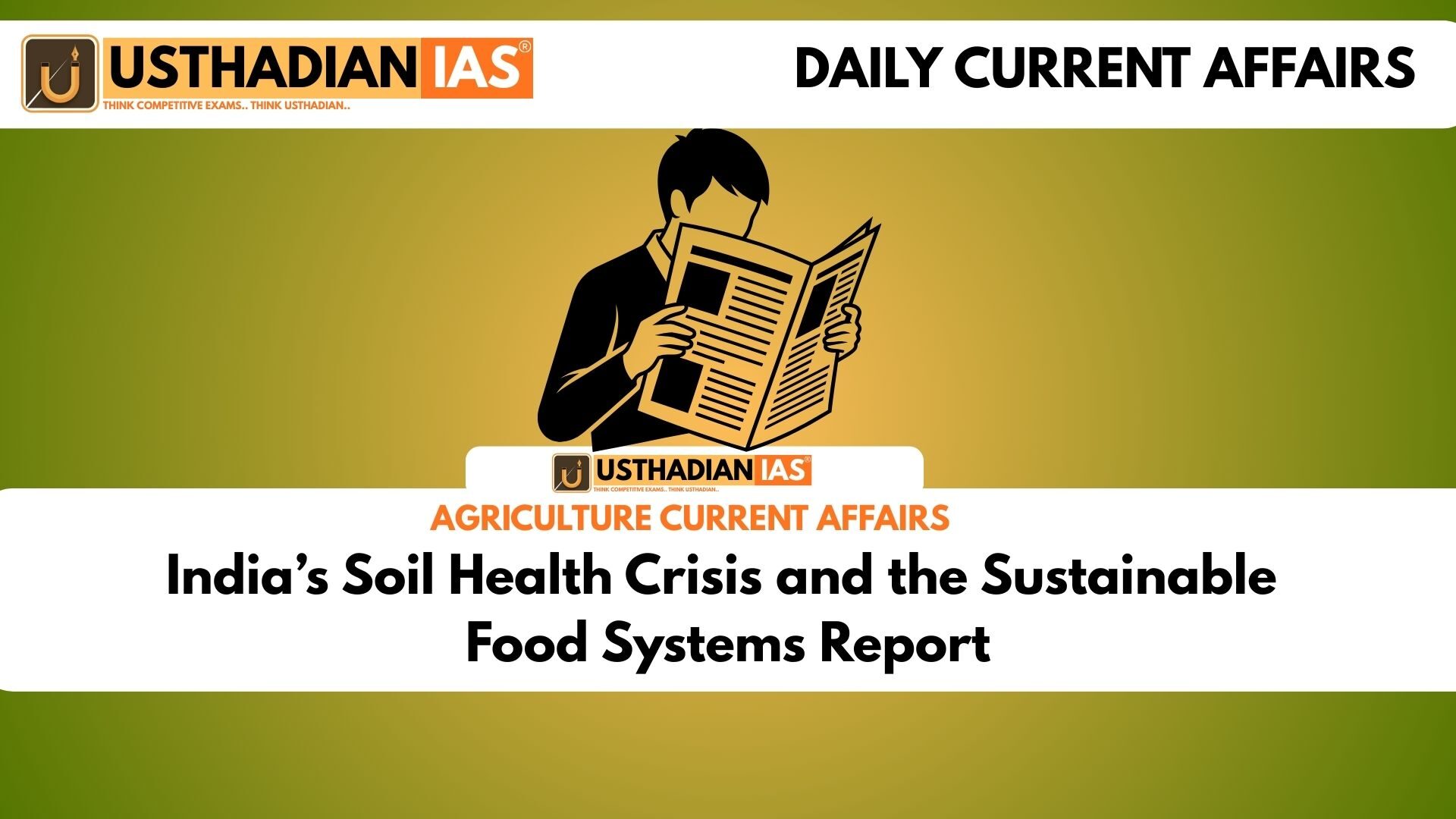Insights from the Sustainable Food Systems Report
India’s Soil Health Crisis and the Sustainable Food Systems Report: The Centre for Science and Environment (CSE) has released a detailed report on Sustainable Food Systems, highlighting severe nutrient imbalances in Indian soils. Based on data from the Soil Health Card (SHC) Scheme, the study reveals widespread nutrient and organic carbon deficits that threaten agricultural sustainability.
Static GK fact: CSE is a New Delhi–based public interest research and advocacy organisation established in 1980 by Anil Agarwal. It focuses on environment, food systems, and sustainable development.
Major Nutrient Deficiencies in Indian Soils
According to the report, 64% of samples tested under the SHC Scheme were low in Nitrogen (N)—a primary nutrient critical for crop growth. Around 48.5% of soils showed low Soil Organic Carbon (SOC), which supports microbial activity and soil structure.
More than 43% of Indian districts facing “very high” climate risk also suffer from poor SOC levels, linking soil health degradation with climate vulnerability.
Micronutrient shortages are equally alarming—55.4% of samples were low in Boron and 35% in Zinc, essential for plant growth and human nutrition.
Static GK Tip: India’s soils are classified into eight major types, including Alluvial, Black, Red, Laterite, Arid, Mountain, Peaty, and Forest soils.
Urea Dependency and Fertiliser Imbalance
India’s fertiliser usage remains highly skewed toward urea, which constituted 68% of total consumption in 2023–24. Overuse of nitrogenous fertilisers disturbs nutrient ratios and leads to declining soil productivity.
The report recommends reforming fertiliser subsidy policies to promote balanced nutrient application and the use of organic and bio-based inputs.
Static GK fact: India introduced the Nutrient Based Subsidy (NBS) policy in 2010 to encourage balanced fertiliser use, though urea remained outside its purview.
Recommendations for Restoring Soil Health
The report urges the government to expand soil monitoring to include physical indicators such as compaction and texture, and biological indicators like microbial activity.
It also advocates biochar application to enhance soil fertility, moisture retention, and carbon storage—key to achieving long-term carbon sequestration and climate resilience.
Strengthening the Soil Health Card Scheme and integrating it under the Rashtriya Krishi Vikas Yojana (RKVY) framework since 2022–23 aims to build comprehensive soil fertility management across India.
Static GK fact: The SHC Scheme was launched in 2015 by the Department of Agriculture and Farmers Welfare to assess soil fertility and guide nutrient-based interventions for farmers.
Static Usthadian Current Affairs Table
India’s Soil Health Crisis and the Sustainable Food Systems Report:
| Topic | Detail |
| Report released by | Centre for Science and Environment (CSE) |
| Year of CSE establishment | 1980 |
| Founder of CSE | Anil Agarwal |
| Report focus | Sustainable Food Systems and soil nutrient health |
| Scheme used for data | Soil Health Card Scheme (2015) |
| Implementing agency | Department of Agriculture and Farmers Welfare |
| Low Nitrogen samples | 64% |
| Low Soil Organic Carbon samples | 48.5% |
| Major micronutrient deficiencies | Boron (55.4%), Zinc (35%) |
| Urea share in fertiliser use | 68% (2023–24) |
| SHC merged with | Rashtriya Krishi Vikas Yojana (RKVY) in 2022–23 |
| Key recommendation | Reform fertiliser subsidy and improve soil monitoring |
| Biochar usage purpose | Fertility, moisture retention, and carbon storage |
| Physical indicators suggested | Texture and compaction |
| Biological indicators suggested | Microbial activity |
| Climate risk correlation | 43% of high-risk districts have low SOC |
| Key outcome of deficiency | Reduced productivity and food security risk |
| Policy under review | Nutrient Based Subsidy (NBS) |
| Core message | Balanced soil management ensures sustainable agriculture |








